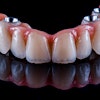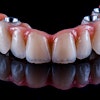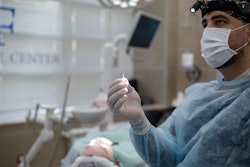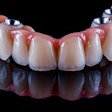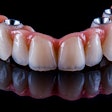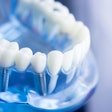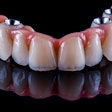Patients who took the antibiotic ciprofloxacin before dental implant surgery may experience a lower implant survival time, according to a study published on February 6 in the International Dental Journal.
The highest implant survival rate appeared to be in patients who received amoxicillin prior to surgery, the authors wrote.
"Premedication with Ciprofloxacin prior to dental implant surgery led to statistically significant lower implant survival time than with amoxicillin and therefore it should be avoided," wrote the authors, led by Dr. Georgios Chatzopoulos of the University of Minnesota.
Since there are no standardized guidelines for prescribing antibiotics prior to implant surgery, a retrospective analysis was conducted to compare the effects of different antibiotics.
This analysis included 41,135 implants inserted into 17,483 individuals, and the patients were followed for a mean time of 81 months (± 52.33 months). Before implant treatment, the patients received amoxicillin, amoxicillin/clavulanic acid, clindamycin, azithromycin, ciprofloxacin, doxycycline, and metronidazole.
Of the implants included in this study, 35,777 (87%) were placed in patients who preoperatively received amoxicillin, while only 47 (0.1%) were prescribed ciprofloxacin.
The implant survival rate was 98.4% for those who took amoxicillin and 98.7% for those who took amoxicillin and clavulanic acid. The other survival rates were as follows:
- 99.5% for metronidazole
- 99% for doxycycline
- 97.9% for ciprofloxacin
- 97.7% for clindamycin
- 97.7% for azithromycin
In the regression analysis, it was revealed that implants placed in patients who received ciprofloxacin had an increased risk of failure (hazard ratio: 1.45, 95% CI: 1.15-1.83, p < 0.001) when compared to those who took amoxicillin, the authors wrote.
Furthermore, ciprofloxacin may negatively affect osteoblast growth. This can lead to delayed bone healing and a reduction in bone density, which may interfere with the osseointegration process, they wrote.
Moreover, the study was not without limitations. There was a lack of information about implant and site specifics, including bone quality, implant surface, and prosthesis type, the authors wrote.
Nevertheless, the authors noted that the study results should be interpreted with caution due to the small number of patients who were prescribed ciprofloxacin, they wrote.
"Implants placed in patients who received Ciprofloxacin preoperatively showed significantly lower cumulative survival implant time than those who had amoxicillin," Chatzopoulos and colleagues wrote.

